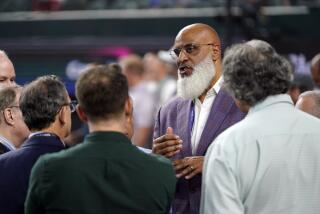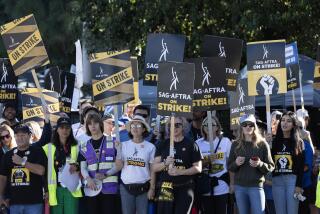Miller Talks to Union : Baseball: Former director speaks with players amid a report their resolve is cracking. Another meeting is scheduled for today.
- Share via
NEW YORK — Baseball’s labor impasse appeared to have reached a critical juncture Saturday, as former Major League Players Association director Marvin Miller took part in a lengthy meeting of players and union officials.
But like so many other times during the negotiations, hope was false, meetings ending without an agreement and the two sides still divided over the issue of salary arbitration for two-year players.
Another session is scheduled for 10:30 EST today.
The National and American leagues seemed close to announcing that opening day games would be canceled or postponed but still were withholding comment.
Miller said he was invited by union director Donald Fehr to provide “historical perspective,” but it seemed apparent Miller had been brought in to remind the union’s older members of their previous labor struggles and promote unity at a time when the players appear to be choosing sides over the issue of salary-arbitration eligibility.
“I’m not here to give a pep talk,” Miller said. “I’m here to give perspective and answer questions.”
Still, it probably is no coincidence that he has arrived just as some of the union’s old guard seem willing to accept ownership’s most recent proposal, which still includes a three-year service requirement for salary arbitration.
One veteran player, who asked not to be identified, said Saturday that the union’s executive board had agreed before the negotiations began that the majority of the players would be happy with the three-years service-time arrangement if all the other issues were addressed satisfactorily. Somewhere along the line, he said, emotion had gotten in the way of a settlement.
“I think that the consensus is that if all the other issues are taken care of, then the arbitration will not be a major factor,” he said. “I think what it comes down to is seeing how all the players react--not just the executive board--to the latest proposal and take a vote on that.”
According to the same source, a player referendum was begun earlier this week by Kansas City Royals catcher Bob Boone and California Angels pitcher Bert Blyleven. Boone, who was a union hard-liner during the 50-day strike of 1981, appears to be leading a faction that would be willing to accept a continuance of the three-year service requirement.
Enter Miller, who held the union together through the grueling 1981 strike. He insisted he didn’t come to give a pep talk, but his presence didn’t seem to be an accident.
Miller emerged from the meeting nearly three hours later, saying that he sensed no cracks in the union’s resolve.
“They are totaling up the impact of how long a stoppage the owners are going to impose on them,” he said. “They are figuring out the dollars. There’s no panic there at all.”
Miller said there were “no cracks” in the union solidarity but admitted “apparently there are some players raising questions out in the hinterlands.”
Ownership also has shown signs of disunity during the 31-day lockout, but chief negotiator Chuck O’Connor said early Saturday morning that management was not likely to go much further than the proposal he sent to the union Friday afternoon.
“I wouldn’t call it a take-it-or-leave-it offer,” he said. “That’s a pejorative term. What (Milwaukee Brewers owner and Player Relations Committee member) Bud Selig did tell the union is that in a labor negotiation, you stretch as far as you can. As far as the economic package, we’ve stretched it as far as we can.”
The proposal Friday called for a minimum major-league salary of $100,000 and a minimum minor-league salary of $25,000, and the annual benefits contribution was pumped up to $55 million. But it removed the $4 million bonus pool for two-year players, which made the overall value of the deal virtually the same as management’s previous proposal.
The Associated Press reported that the players proposed binding arbitration on the key issue of arbitration eligibility, and while owners did not immediately reject it, their chief negotiator, Chuck O’Connor, said it would be a “tough sell.”
More to Read
Go beyond the scoreboard
Get the latest on L.A.'s teams in the daily Sports Report newsletter.
You may occasionally receive promotional content from the Los Angeles Times.










